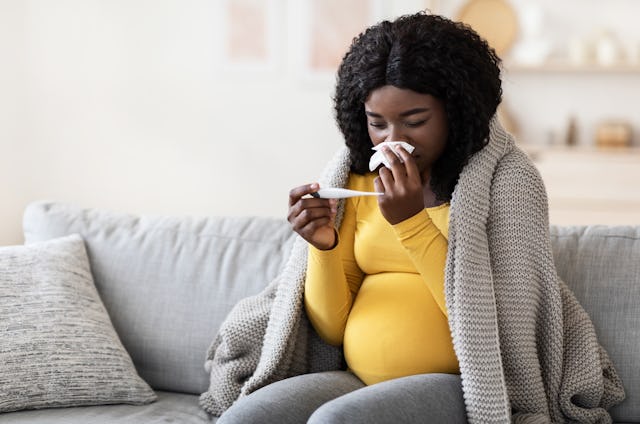Can You Take NyQuil While Pregnant? What To Do (& Not Do) For Your Cold Or Flu
Dr. Sharee L. Livingston explains pregnancy protocol with this go-to medicine.

You should be prepared to give up some things when you become a mom (even if only temporarily), and many start the second you become pregnant. Sleep, sex, and alone time are just a few of the biggies. But some are not so obvious — like hitting up the local drugstore for some over-the-counter drugs to clear up a common cold. Think we're kidding? While it's true that 9 in 10 people take medicine during pregnancy, we spoke to an expert and found that there are some medicines you should avoid through all three trimesters.
According to Pennsylvania-based ob-gyn Dr. Sharee L. Livingston, "OTC medications are [generally] safe during pregnancy, especially if used as recommended. Some of these medications include pain relievers, decongestants, antihistamines, antidiarrheals, and antacids."
But when asked about NyQuil specifically, a cold medicine that many people — including pregnant mothers — reach for when those awful cold and flu symptoms like fever and sore throat kick in, Livingston added a crucial caveat.
Can you take Nyquil while pregnant?
"Most OTC medications have an excellent safety profile, but not all of them are created equally," Livingston tells Scary Mommy. "Some medications, like NyQuil, should be avoided during pregnancy. Most NyQuil products contain a small amount of alcohol, and like [alcoholic beverages], should be avoided during pregnancy."
Some formulations of NyQuil also contain the decongestant phenylephrine. Studies show a small elevated risk associated with phenylephrine during pregnancy and fetal development, which could lead to birth differences. The risk seems to be increased if the medication is taken during the first trimester.
There you have it. NyQuil is not safe to take while pregnant.
So, where can pregnant moms find respite from a cold or flu that won't put their babies at risk? Here are a few natural remedies that can buy you some relief — but not sleep, or privacy, or the ability to sneeze without peeing. Sorry, that's just part of being a mom!
How can you treat a cold or flu during pregnancy safely?
1. Stay Hydrated
There's nothing like lots of clear fluids to help flush your system of those cold and flu germs. Aim to drink eight to 12 cups of water per day.
2. Steam
Got a stuffy nose? If you don't have a facial steamer or hot-mist vaporizer, sitting in your bathroom with the doors closed and running your shower on hot for several minutes will thin out your mucus enough to drain from your nose.
3. Gargle With Salt
This sounds gross, and it doesn't taste great either, but adding a teaspoon of salt to a glass of warm water and using it to gargle can clear out phlegm and germs and soothe a sore throat.
4. Sip Honey Lemon Tea
Not a fan of gargling with salty water? Add fresh lemon juice and honey to hot water or your favorite herbal tea (make sure it's safe for pregnant people) — the combination of vitamin C and antibacterial properties will help kill off germs and provide relief from a sore throat.
5. Alternate Hot and Cold Compresses
Whether your sinuses are causing pain and swelling in your face or you've got the chills, alternating between hot and cold compresses will help reduce swelling and stop you from shivering. A hot or cold pack, or a simple washcloth, will do the trick.
6. Sleep
If able, try to get as much sleep as possible so your immune system can go to work fighting off germs. In fact, when we sleep, the immune system produces infection-fighting antibodies and proteins, helping us recover more quickly.
Can I get the flu shot during pregnancy?
To help fight against getting the flu altogether, a flu shot is one of the best lines of protection. And yes, it is safe for a pregnant person to get the vaccine. The Centers for Disease Control and Prevention actually recommends it. A person immunized during their last trimester also protects their baby from the flu for a couple of months after birth.
Expert Sources:
Dr. Sharee L. Livingston, ob-gyn
This article was originally published on